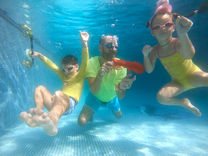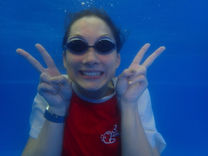Swimming for a better childhood: Yes or No?
How does swimming give children a better childhood? What can swimming learn from childhood? And what can childhood learn from swimming? Do they have anything in common and what makes them different from each other? When swimming and childhood come together, then ... what? Are swimming and childhood growing up partners?
Have you ever had the opportunity to get swimming and childhood meet each other? I know most of you have. If you by any chance missed that opportunity, this is their story, and maybe yours.
Who are actually SWIMMING and CHILDHOOD?
They have known each other since the time of diapers, the first dive, water bubbles. Day by day, step by step, stroke by stroke, they created their world in and around the water. Two friends. The younger one is called SWIMMING, and the older one is known in the neighbourhood as CHILDHOOD. They spent each holiday together. They swam whenever they had the chance. They played barefoot on the sand and grass. And then, they grew up overnight. They started their own families, and became parents.
SWIMMING and CHILDHOOD passed on their rich experience of growing up to children. How? Simply, by telling them stories about adventures from the water, trees, grass, but also by swimming and playing. They successfully managed to get the children learn about the world of SWIMMING and CHILDHOOD, pros and cons, by using various questions and answers, and encouraging their desire to swim and play.
Maybe your experience with SWIMMING and CHILDHOOD is different, but this is theirs and I can just say that mine is the same.
What can SWIMMING learn from CHILDHOOD?
Childhood teaches Swimming that emotions are a signal of what is going on. That every scratch heals, and that tears disappear with a kiss. Childhood allows Swimming to touch and experiment. To play the melody of carefreeness. It finds the rhythm of courage whenever fear lurks from behind. Childhood reflects happiness even when it’s snowing or raining. Childhood loves swimming the most!
What can CHILDHOOD learn from SWIMMING?
Swimming makes children feel safe while growing up. It nourishes their health and creates good habits. It is a great teacher. Along with Swimming, Childhood learns about the elements of the play near the water and the rules to be followed when in and near the water. There is no room for mistakes. Rules and choices exist, and decisions are respected. With everyday swimming, Childhood learns what it means to stay persistent, consistent, and develops its own skills. It trains concentration. Swimming creates energy and provides the future with faith in oneself.
What do Swimming and Childhood have in common?
The process of learning, maturing ... Swimming and Childhood provide experience, skills and values. They remind us that the play is a train to a better future. That no will means no desire. And that without being persistent, our sweetest dreams will never come true. They don’t let us forget how it is like to feel free. That character is more important than their strength. They point out that routine is important. It reduces stressful and unwanted situations both in Swimming and Childhood, and thus creates stable swimmers and players.
What makes Childhood and Swimming DIFFERENT from each other?
They never look like each other. They have unique experiences both in the water and on the grass. Childhood would only like to play and have fun, while swimming still requires a certain degree of being serious. Childhood is carefree, it does not think much, while swimming never stops thinking.
When SWIMMING and CHILDHOOD work as a team, they make ... the best day, a moment to remember. Of course, they make you know the feeling of free movement, allowing children to explore the world with confidence in the water and around it. Swimming and childhood give you an opportunity to enjoy adventures, surprises and make wonderful memories. They nurture friendship, they influence the next generation of swimmers, players. They offer skills that make growing up and life easier. They make a balance between hot and cold currents.
SWIMMING gives children a better CHILDHOOD? Yes. Swimming boosts the character of childhood, its heart and soul. Also, swimming has the ability to shape the conscience of childhood in relation to the emotional connection it had with it. It is from this "universal connection" that Swimming and Childhood develop a sense of empathy, justice and self-control while growing up. Swimming definitely gives childhood a stronger bond with the family.
SWIMMING and CHILDHOOD are partners in growing up. They give attitude and integrity. And a variety of answers to children's big questions about life. They create a family heritage and its cosiness. They are encouraging. They make good fun. They remind us that laughter and hugs are an important part of our day, and that the support in the water and on the ground is a cornerstone of a friendship, while eye contact is a way of understanding the most difficult puzzles. Swimming and Childhood provide a variety of possibilities, offering countless opportunities. Together they make the family safer and carefree.
How can swimming make a childhood better?
It provides a better childhood through the very skill of mastering swimming and moving through water, because it is for the first time that a child becomes independent in his or her movement in another environment, without it being the ground under his or her feet, and sometimes even before they can walk…
Swimming and Childhood have taught me...
That they can't and don't go without each other. That I should have fun and stay young forever. That I should play and enjoy it. But also how to feel safe. Because life, just like childhood, is better when you are swimming!
Swimming and Childhood have both the past and the future. We as parents should decide what we want to offer our children in the present.
For me, childhood is more beautiful with swimming!
What’s your experience?


























































Comentários